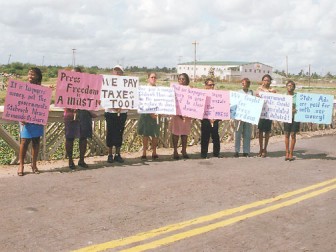US Ambassador David Robinson told Washington in 2007 that international observers were increasingly uneasy about the “autocratic” tendencies of President Bharrat Jagdeo and his willingness to hit critics – like Stabroek News – where it hurts.
In a cable dated February 8, 2007, Robinson referred to the then controversy over the government’s withdrawal of advertising from Stabroek News the previous November.
He said the escalating conflict showed Jagdeo’s mounting willingness “to lash out at critics with more than verbal attacks”. Robinson’s position also made it clear that Washington did not believe the government’s explanation that the ad withdrawal was a commercial decision but saw it more as a direct reaction by the President to criticism by Stabroek News.
Noting that SN had pro-mised to carry a protest banner on its front page every day while the ban was in place and received much support from international press bodies, Robinson pointed out that the Commonwealth Press Union and the Inter-American Press Association had both characterized the withdrawal of the ads as an attack on press freedom.

Referring to Jagdeo’s defence that the decision to withdraw the ads was purely commercial, Robinson said that almost all observers saw the pulling of the ads as a punitive measure against what the ambassador described as the “only articulate critic” of the administration.
“Jagdeo has gone public with his criticism of Stabroek News‘ campaign, calling it ‘sad and pathetic’. He continues to insist that the decision to withdraw advertising was purely commercial, and has accused Stabroek News of painting a false picture of events to win sympathy abroad. In fact, Jagdeo’s explanation narrowly conforms with the letter of the law, which demands only that the GoG place its ads in at least one private sector newspaper in addition to government-controlled media outlets. But almost all observers recognize that pulling the ads from the only articulate critic of the administration is a punitive slap, not a financial move, and it may be working,” the Ambassador said. He noted that the other two major dailies – the Guyana Chro-nicle and the Kaieteur News – had covered the story in a manner more sympathetic to the President “than to their angry competitor”.
Kaieteur News had supported the government’s withdrawal of advertising from SN.
Robinson also related the views of a well-known city businessman that Jagdeo was prepared to hit critics where it hurt – the bottom line. Robinson quoted the businessman as saying that he was particularly troubled by “Jagdeo’s apparent willingness to hit his critics in the pocketbook, rather than merely lambasting them in public as he has done in the past.” Robinson added that “Similarly, major donor chiefs of mission—including the British, Canadians, IMF, World Bank, IDB, UNDP and us—agreed at a recent donors’ lunch that the ad controversy is just the latest in a growing list of moves by Jagdeo to consolidate power in himself. Even the old guard in the People’s Progressive Party, Jagdeo’s own platform, is privately critical of the President’s dismissive attitude toward it and other political and governmental institutions.”
Robinson commented that their concern about his increasingly arrogant style was unlikely to bother Jagdeo as he faced a neutered opposition, a docile Parliament and a tame press with Stabroek News being the lone exception.
“Our collective concern about an increasingly arrogant chief executive is unlikely to cause Jagdeo much heartburn. He faces a neutered opposition, a docile parliament, and a tame press – with Stabroek News the lone vocal exception.”
Robinson saw the need for coordination among the donors to encourage Jagdeo and his inner circle to keep their pledge for greater democratic inclusion.
“The major donors chiefs of mission, including the Ambassador, are coordinating talking points for public and private use encouraging the president and his inner circle to keep their campaign pledge for greater
democratic inclusion in a robust reform program. The real opportunity to make that point will come when Jagdeo asks for help, as we expect he will, in holding local elections either later this year or early in 2008. We should insist that specific electoral and constitutional reforms are in place before taking out our wallet. In the meantime, some conditionality associated with (IDB) debt relief is a lever we should only reluctantly drop,” Robinson added.





